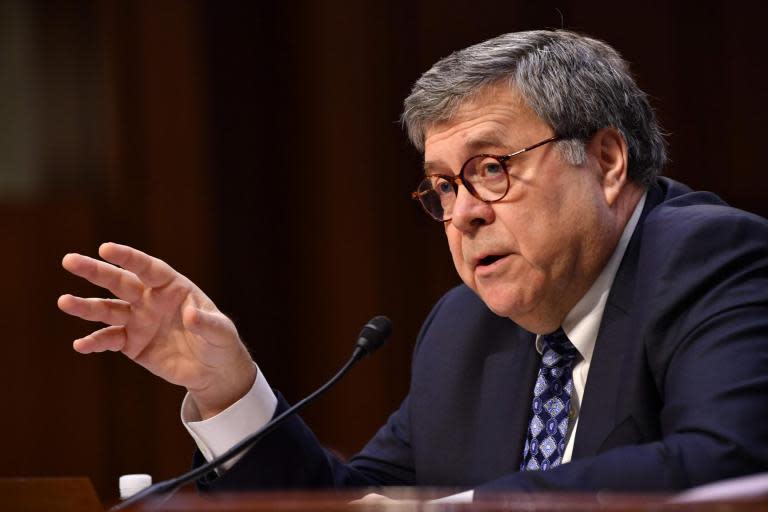Trump's Attorney General pick raises alarms with comments on probing Clinton foundation and uranium conspiracy
New questions have been raised surrounding Donald Trump's pick to become the next attorney general and his views on investigating the Clinton Foundation and a uranium mining company.
William Barr began two days of confirmation hearings on Tuesday to become the next head of the Justice Department, fielding questions from senators about Special Counsel Robert Mueller’s investigation into Russian impact on the 2016 election and other legal issues he would oversee if confirmed.
The Republican — who served as attorney general from 1991 to 1993 — was confronted with comments he provided to the New York Times in 2017 during his first day of hearings, in which he suggested the Justice Department had more of a legal basis to investigate the Clinton Foundation and a longstanding conspiracy theory surrounding a uranium deal under Hillary Clinton’s tenure as secretary of state than it did probing Mr Trump’s alleged obstruction of justice.
The conspiracy theory alleges that a Russian energy nuclear agency donated to the Clinton Foundation in order to later secure Ms Clinton's approval of its purchase of a uranium mining company - Uranium One.
Mr Barr played off the comments as inconsequential at first, telling senators, "I have no knowledge of Uranium One” and adding “I didn’t particularly think that was necessarily something that should be pursued aggressively."
"The point I was trying to make there was that whatever the standard is for launching an investigation, it should be dealt with evenhandedly," he continued.
Questions have been raised about what Bill Barr told us for a story in 2017. Here is his full email from then responding to our request for comment. We're grateful he replied and hope this clarifies any confusion. pic.twitter.com/xTCsJSpic2
— Peter Baker (@peterbakernyt)
However, the New York Times reporter who interviewed Mr Barr shared his full email response from the 2017 exchange during the hearing, providing more context to Mr Barr’s comments. The nominee had suggested in a paragraph that was not included in the initial report that he “long believed that the predicate for investigating the uranium deal, as well as the [Clinton] foundation, is far stronger than any basis for investigating so-called ‘collusion.’”
When presented with the full email exchange in real-time, Mr Barr was forced to further explain his remarks.
"I didn’t necessarily say that the Clinton Foundation should be criminally investigated," he said. "It was the kind of thing that I think should have been looked at from a tax standpoint and whether it was complying with the foundation rules the way a corporate foundation is."
"I thought that there were some things there that merited some attention," he continued. "But I wasn’t thinking of it in terms of a criminal investigation of the foundation."
The theory has been routinely debunked, and several investigations have seen no charges being filed. The Clinton Foundation was forced to admit a shortcoming in its disclosure practices and pledged to correct those mistakes dating between 2009 and 2012.
Mr Barr’s apparent attitudes towards the conspiracy theory and his suggestions to probe the Clinton Foundation have caused concern among Democrats and the left, who have questioned how he fairly reached the conclusion the Justice Department had a “far stronger” basis to investigate those matters than alleged collusion between Russia and the Trump campaign.
Still, Mr Barr’s confirmation is a near-guarantee, with Republicans holding a majority in the Senate. On Tuesday, he declined to commit to recusing himself from overseeing the Russia probe, telling senators he wouldn’t be “bullied” by Mr Trump or anyone into making decisions as the next head of the department.


